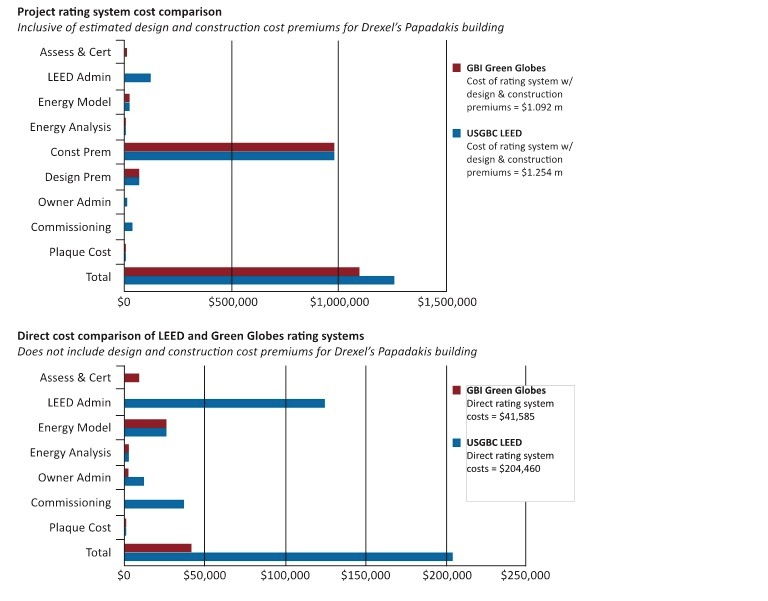The Green Building Initiative (GBI) today announced that, according to a recent study completed by Drexel University professor Jeffrey Beard, GBI’s Green Globes certification process is significantly less expensive to conduct and faster to complete than LEED certification, according to GBI president Jerry Yudelson.
“Green Globe certification currently gives the market a choice among certification systems and provides competition that helps improve results for users, resulting in more innovation and lower costs over time,” Yudelson said. “In this particular project, the cost savings to the University were on the order of $1.00 per square foot, a significant number for a large building.”
The final report, prepared by Beard, an associate professor in the ?Department of Construction Management at Drexel’s College of Engineering, is titled “A Study of Comparative Sustainability Certification Costs/Green Rating System Cost Comparison Study: LEED and Green Globes.” Beard’s research examined:
- Intrinsic hard costs – allocable on a line-by-line basis – for meeting criteria in each of the rating systems;
- Soft costs, whether accounted for as part of the indirect project costs or secondary soft costs that arose as a result of the project, but were otherwise allocated or absorbed; and
- Optional costs arising from implementation of the two green building rating systems.
The research was confined to the Papadakis Integrated Sciences Building at Drexel’s West Philadelphia campus, a five-story, 130,000-square-foot laboratory and classroom building that opened in 2011.
A key variance in the two rating systems that was revealed by the study was the cost of using each for the Papadakis building. The breakdown summarized in the university’s records indicates internal (staff time) costs at Drexel for administering both systems were more than $125,000 for LEED versus $9,000 for Green Globes. The report’s summary shows aggregate green building costs (i.e., hard cost premium, soft costs and optional costs for sustainability rating) nearly 15 percent higher for LEED than for Green Globes. The table below illustrates cost differences between LEED and Green Globes in several key areas of design, management and assessment.
Funding for the study came from the Green Building Initiative. However, Professor Beard conducted the research without any oversight from GBI, using timesheets and other records of administrative costs maintained by the project team and Drexel University.
The Papadakis Building received three Green Globes from GBI and a LEED Gold rating from the US Green Building Council. The architects were Toronto, Canada-based Diamond Schmitt Architects and H2L2 of Philadelphia. Turner Construction Company provided construction services.
About the Green Building Initiative™ - The GBI is a nonprofit organization and American National Standards Institute (ANSI) Standards Developer dedicated to accelerating the adoption of green building practices. Founded in 2004, the organization is the sole U.S. provider of the Green Globes® and federal Guiding Principles Compliance building certification programs. To learn more about opportunities to become involved in the GBI, contact Jerry Yudelson, President,(jerry@thegbi.org), visit the GBI website,www.thegbi.org, or send an email to GBI's Marketing Director Shaina Sullivan (shaina@thegbi.org)
Related Stories
Designers | Oct 1, 2024
Global entertainment design firm WATG acquires SOSH Architects
Entertainment design firm WATG has acquired SOSH Architects, an interior design and planning firm based in Atlantic City, N.J.
Higher Education | Sep 30, 2024
Studio Gang turns tobacco warehouse into the new home of the University of Kentucky’s College of Design
Studio Gang has completed the Gray Design Building, the new home of the University of Kentucky’s College of Design. In partnership with K. Norman Berry Associates Architects, Studio Gang has turned a former tobacco warehouse into a contemporary facility for interdisciplinary learning and collaboration.
Warehouses | Sep 27, 2024
California bill would limit where distribution centers can be built
A bill that passed the California legislature would limit where distribution centers can be located and impose other rules aimed at reducing air pollution and traffic. Assembly Bill 98 would tighten building standards for new warehouses and ban heavy diesel truck traffic next to sensitive sites including homes, schools, parks and nursing homes.
Laboratories | Sep 27, 2024
Traditional lab design doesn't address neurodiverse needs, study finds
A study conducted by ARC, HOK, and the University of the West of Scotland, has revealed that half (48.1%) of all survey respondents who work in laboratory settings identify as neurodivergent.
Laboratories | Sep 26, 2024
BSL conversions: A cost-efficient method to support high-containment research
Some institutions are creating flexible lab spaces that can operate at a BSL-2 and modulate up to a BSL-3 when the need arises. Here are key aspects to consider when accommodating a rapid modulation between BSL-2 and BSL-3 space.
MFPRO+ News | Sep 24, 2024
Major Massachusetts housing law aims to build or save 65,000 multifamily and single-family homes
Massachusetts Gov. Maura Healey recently signed far-reaching legislation to boost housing production and address the high cost of housing in the Bay State. The Affordable Homes Act aims to build or save 65,000 homes through $5.1 billion in spending and 49 policy initiatives.
Designers | Sep 20, 2024
The growing moral responsibility of designing for shade
Elliot Glassman, AIA, NCARB, LEED AP BD+C, CPHD, Building Performance Leader, CannonDesign, makes the argument for architects to consider better shade solutions through these four strategies.
Mixed-Use | Sep 19, 2024
A Toronto development will transform a 32-acre shopping center site into a mixed-use urban neighborhood
Toronto developers Mattamy Homes and QuadReal Property Group have launched The Clove, the first phase in the Cloverdale, a $6 billion multi-tower development. The project will transform Cloverdale Mall, a 32-acre shopping center in Toronto, into a mixed-use urban neighborhood.
Codes and Standards | Sep 19, 2024
Navigating the intricacies of code compliance and authorities having jurisdiction
The construction of a building entails navigating through a maze of regulations, permits, and codes. Architects are more than mere designers; we are stewards of safety and navigators of code compliance.
Higher Education | Sep 18, 2024
Modernizing dental schools: The intersection of design and education
Page's John Smith and Jennifer Amster share the how firm's approach to dental education facilities builds on the success of evidence-based design techniques pioneered in the healthcare built environment.

















